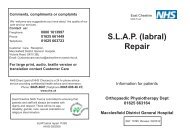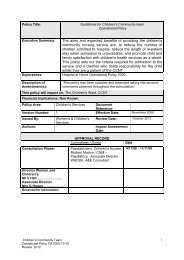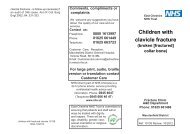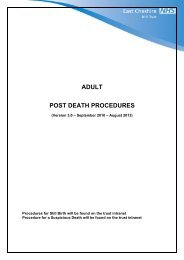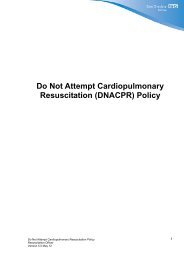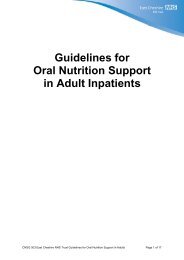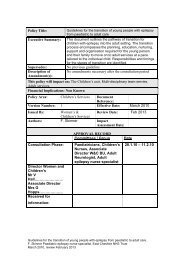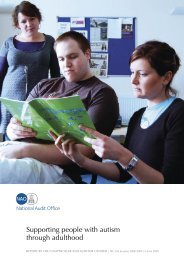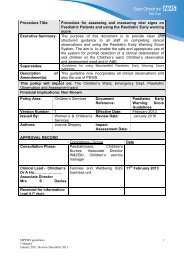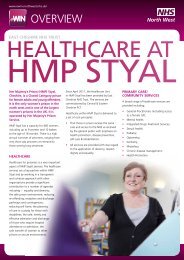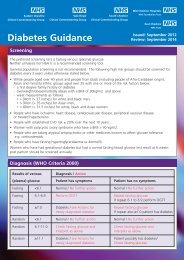Paediatric diabetes operational 1745.pdf - East Cheshire NHS Trust
Paediatric diabetes operational 1745.pdf - East Cheshire NHS Trust
Paediatric diabetes operational 1745.pdf - East Cheshire NHS Trust
Create successful ePaper yourself
Turn your PDF publications into a flip-book with our unique Google optimized e-Paper software.
Patient InvolvementThere is an active Diabetes UK local support group. The PDSN attends the committeemeetings and most of the organised events.Treatment, Follow up and ScreeningNICE have developed guidelines for the management of a number of different aspects ofpaediatric <strong>diabetes</strong> care. The MDT has tried to implement these recommendations into ourworking practices. We endeavor to provide a service as detailed in the guidelines whereresources allow. The MDT work towards target HbA1c of 58 mmols/mol (7.5 %) whilerecognising that this target is often difficult to achieve.At diagnosis all new patients will be managed by the MDT at the earliest opportunity. Thiswill normally be on the day of admission or within the next 24 hours. It may not be possibleto meet this target at weekends or over Bank Holidays. Ward staff are encouraged tocontact Dr Chandrasekaran or Nicola Birtwistle about all new admissions and they will oftenbe able to provide advice even when not on call. Children will be seen by the consultant orPDSN within 24 hours of admission where possible or the next working day, and will begiven an appointment to see the dieticians within a week post diagnosis. At the time ofadmission young people will be investigated according to recommendations in the NICEguideline as incorporated into our local guidelines. Children who are well will be starteddirectly onto sub‐cutaneous insulin therapy. This will be multiple injection therapy fromdiagnosis. If patients are unwell at the time of admission they will be stabilised onintravenous treatment following the BSPED DKA protocol.During the initial admission the PDSN will commence a structured teaching programme andthis will be continued and completed following discharge. Our specialist dietician willdiscuss dietary issues with the family and young person including provisional advice oncarbohydrate counting and dose adjustment. Further discussions will take place at homefollowing discharge. Families will receive a lot of support at home following diagnosis withregular visits and phone contacts from the PDSN. These visits will continue until the PDSNand the families are happy with the initial management.Patients will be offered follow up appointments at least every 3 months in the clinic. Wherethe need arises patients will be offered earlier reviews either in the consultant or nurselead clinic. At each appointment we will review the young person’s progress and addressany issues that have arisen. Families will also be offered the opportunity of seeing a PDSNand a dietician at all clinics. Currently appointment times are every 20 minutes withadditional time available for nursing and dietetic review.At all outpatient clinics near patient testing will take place so HbA1C will be available for allpatients at the time of their appointments.Each clinic room is equipped with a computer that could enable the downloading of datafrom blood glucose machines and insulin pumps.The MDT follows guidance from NICE on screening. At least annually patients have an MOT.Bloods are obtained for coeliac antibodies at diagnosis. Thyroid functions will be monitoredin all patients annually. In addition, children over the age of 12 years will have their lipidlevels checked, a urine sample is collected for ACR measurements and a blood pressure isobtained. We also collect data on the young person’s HbA1c results and record anyadmissions over the last 12 months. Children over the age of 12 are referred to the districtscreening programme for annual retinal screening.We have the facilities to conduct continuous blood glucose monitoring if this is requiredwith access to our own monitor.For young people who are experiencing problems with their <strong>diabetes</strong> we will endeavor toChildren’s Diabetes MDT Operational Policy May 23, 2012 14




